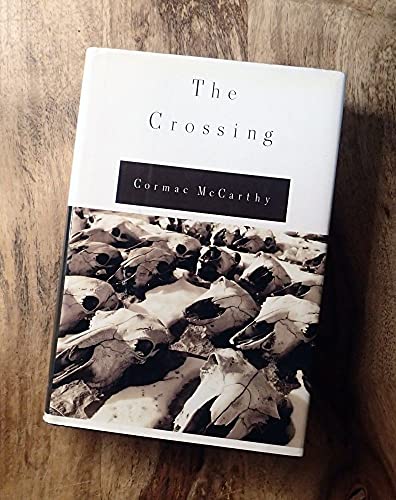Articoli correlati a The Crossing

Sinossi
In the 1930s, Billy and his family come to Hidalgo County, New Mexico, where he becomes obsessed with a wild wolf that lives a precarious existence threatened by the region's ranchers. By the author of All the Pretty Horses. 150,000 first printing. $150,000 ad/promo.
Le informazioni nella sezione "Riassunto" possono far riferimento a edizioni diverse di questo titolo.
Informazioni sull?autore
Cormac McCarthy was born in Rhode Island in1933 and spent most of his childhood near Knoxville, Tennessee. He served in the U.S. Air Force and later studied at the University of Tennessee. In 1976 he moved to El Paso, Texas, where he lives today. McCarthy's fiction parallels his movement from the Southeast to the West--the first four novels being set in Tennessee, the last three in the Southwest and Mexico. The Orchard Keeper (1965) won the Faulkner Award for a first novel; it was followed by Outer Dark (1968), Child of God (1973), Suttree (1979), Blood Meridian (1985), and All the Pretty Horses, which won both the National Book Critics Circle Award and the National Book Award for fiction in 1992. The Crossing is his seventh novel and the second in McCarthy's Border Trilogy.
From the Trade Paperback edition.
Dal risvolto di copertina interno
l the Pretty Horses in Cormac McCarthy's Border Trilogy is a novel whose force of language is matched only by its breadth of experience and depth of thought.
In the bootheel of New Mexico hard on the frontier, Billy and Boyd Parham are just boys in the years before the Second World War, but on the cusp of unimaginable events. First comes a trespassing Indian and the dream of wolves running wild amongst the cattle lately brought onto the plain by settlers -- this when all the wisdom of trappers has disappeared along with the trappers themselves. And so Billy sets forth at the age of sixteen on an unwitting journey into the souls of boys and animals and men. Having trapped a she-wolf he would restore to the mountains of Mexico, he is long gone and returns to find everything he left behind transformed utterly in his absence. Except his kid brother, Boyd, with whom he strikes out yet again to reclaim what is theirs thus crossing into "that antique gaze from whence there could be no way b
Le informazioni nella sezione "Su questo libro" possono far riferimento a edizioni diverse di questo titolo.
EUR 8,57 per la spedizione da U.S.A. a Italia
Destinazione, tempi e costiCompra nuovo
Visualizza questo articoloEUR 25,72 per la spedizione da U.S.A. a Italia
Destinazione, tempi e costiRisultati della ricerca per The Crossing
The Crossing
Da: ThriftBooks-Dallas, Dallas, TX, U.S.A.
Hardcover. Condizione: Good. No Jacket. Pages can have notes/highlighting. Spine may show signs of wear. ~ ThriftBooks: Read More, Spend Less 1.33. Codice articolo G0394574753I3N00
Quantità: 2 disponibili
The Crossing
Da: ThriftBooks-Phoenix, Phoenix, AZ, U.S.A.
Hardcover. Condizione: Fair. No Jacket. Missing dust jacket; Readable copy. Pages may have considerable notes/highlighting. ~ ThriftBooks: Read More, Spend Less 1.33. Codice articolo G0394574753I5N01
Quantità: 1 disponibili
The Crossing
Da: ThriftBooks-Atlanta, AUSTELL, GA, U.S.A.
Hardcover. Condizione: Fair. No Jacket. Missing dust jacket; Readable copy. Pages may have considerable notes/highlighting. ~ ThriftBooks: Read More, Spend Less 1.33. Codice articolo G0394574753I5N01
Quantità: 2 disponibili
The Crossing
Da: ThriftBooks-Reno, Reno, NV, U.S.A.
Hardcover. Condizione: Fair. No Jacket. Missing dust jacket; Readable copy. Pages may have considerable notes/highlighting. ~ ThriftBooks: Read More, Spend Less 1.33. Codice articolo G0394574753I5N01
Quantità: 1 disponibili
The Crossing
Da: ThriftBooks-Dallas, Dallas, TX, U.S.A.
Hardcover. Condizione: Fair. No Jacket. Missing dust jacket; Readable copy. Pages may have considerable notes/highlighting. ~ ThriftBooks: Read More, Spend Less 1.33. Codice articolo G0394574753I5N01
Quantità: 2 disponibili
The Crossing
Da: ThriftBooks-Dallas, Dallas, TX, U.S.A.
Hardcover. Condizione: Good. No Jacket. Missing dust jacket; Pages can have notes/highlighting. Spine may show signs of wear. ~ ThriftBooks: Read More, Spend Less 1.33. Codice articolo G0394574753I3N01
Quantità: 4 disponibili
The Crossing
Da: ThriftBooks-Reno, Reno, NV, U.S.A.
Hardcover. Condizione: Good. No Jacket. Missing dust jacket; Pages can have notes/highlighting. Spine may show signs of wear. ~ ThriftBooks: Read More, Spend Less 1.33. Codice articolo G0394574753I3N01
Quantità: 4 disponibili
The Crossing
Da: ThriftBooks-Atlanta, AUSTELL, GA, U.S.A.
Hardcover. Condizione: Good. No Jacket. Former library book; Missing dust jacket; Pages can have notes/highlighting. Spine may show signs of wear. ~ ThriftBooks: Read More, Spend Less 1.33. Codice articolo G0394574753I3N11
Quantità: 1 disponibili
The Crossing
Da: ThriftBooks-Reno, Reno, NV, U.S.A.
Hardcover. Condizione: Fair. No Jacket. Readable copy. Pages may have considerable notes/highlighting. ~ ThriftBooks: Read More, Spend Less 1.33. Codice articolo G0394574753I5N00
Quantità: 5 disponibili
The Crossing
Da: ThriftBooks-Phoenix, Phoenix, AZ, U.S.A.
Hardcover. Condizione: Good. No Jacket. Missing dust jacket; Pages can have notes/highlighting. Spine may show signs of wear. ~ ThriftBooks: Read More, Spend Less 1.33. Codice articolo G0394574753I3N01
Quantità: 3 disponibili

